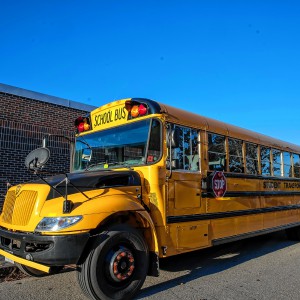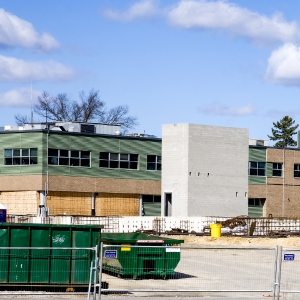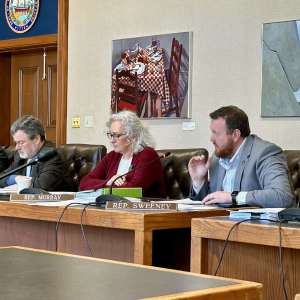Ayotte and lawmalers agree on a three-year landfill moratorium in New Hampshire. Is this the final answer?

Conway public works staffer Tim Shackford gets ready to dump of dirt over the garbage in the city landfill on Wednesday, January 18, 2023. GEOFF FORESTER
| Published: 03-31-2025 4:54 PM |
New Hampshire is inching closer to a pause on new landfills, with Gov. Kelly Ayotte now supporting a three-year moratorium — a middle ground between her first proposals and the five-to-six year ban lawmakers sought.
In February, Ayotte endorsed a one-year moratorium on new landfill development. The amended policy section of the state budget, known as HB2, includes a three-year moratorium on new landfills.
State Rep. Nicholas Germana, a key advocate for landfill legislation, sees the three-year moratorium as reasonable.
“It’s clearly a compromise between what some of us would like to see, five or six and what the governor had originally supported. Three falls in the middle,” said Germana, a Keene Democrat. “So I think that that hopefully will be a strong sign to the Senate that this is the direction we ought to go in.”
Originally, the House backed a five-year moratorium before settling on three. The Senate had considered a six-year pause, but it was killed.
If approved, the three-year moratorium would last until July 1, 2028.
During the pause, the Department of Environmental Services would still be able to accept new landfill applications, but it will only determine if they’re complete.
In addition, the trailer bill puts a temporary hold on any new solid waste disposal capacity — meaning no new landfills, large transfer stations, collection or storage facilities would be approved until new rules are adopted or by July 1, 2026, whichever comes first.
Article continues after...
Yesterday's Most Read Articles
 House committee defunds relief program for mothers and children, spares SNAP incentives
House committee defunds relief program for mothers and children, spares SNAP incentives
 No high-speed E-ZPass at Hooksett tolls for at least two months
No high-speed E-ZPass at Hooksett tolls for at least two months
 New Hampshire law enforcement to step up traffic enforcement on Route 106
New Hampshire law enforcement to step up traffic enforcement on Route 106
 Schools in Lakes Region explore creating a special education school to bring down costs
Schools in Lakes Region explore creating a special education school to bring down costs
 Work continues on new state psychiatric hospital in Concord
Work continues on new state psychiatric hospital in Concord
 House committee reverses vote, adopts prohibition on DEI activities and spending
House committee reverses vote, adopts prohibition on DEI activities and spending
The push on the brakes comes from environmental advocates and lawmakers who want to give the state more time to strengthen landfill regulations, arguing that the solid waste rules updated in December are too weak.
One concern is that the new rules would allow landfills to be built in locations that could threaten groundwater, surface water and public health.
Michael Wimsatt, director of the state’s environmental agency, declined to take a stance on the latest version of the bill.
“What I can tell you is that the original version of HB2, as presented to the House by the governor, we support,” said Wimsatt.
Lawmakers on the House Environment and Agriculture Committee struck another deal on landfill legislation — this time, focusing on the impact to a host community. That means weighing everything from human health risks and property values to water pollution, greenhouse gas emissions, tourism, outdoor recreation and affect on wildlife.
Originally, the trailer bill placed this assessment at the very end of the permitting process.
After working with the Governor’s office, Germana said they’ve reached a compromise — the assessment will happen at the beginning for any new proposals, before permits are even considered. For landfill applications already in progress, like Casella Waste Systems’ controversial Dalton proposal, the assessment will still happen at the end.
Every year, lawmakers introduce several bills aimed at strengthening landfill regulations in the state, which imports as much as half of all trash from neighboring states. The state’s environmental agency has stayed neutral on landfill legislation and often points to concerns about how tighter rules could affect the solid waste market in New Hampshire. These bills rarely make it to the governor’s desk.
Germana thinks this year could be different.
“The folks at DES, I’m confident, are always trying to do what’s right for the environment, but they’re also operating in a political environment, and their directives come from the governor’s office,” said Germana. “So under Gov. Sununu, we had a governor who was more interested in corporate interests, and in this case, I want to give Gov. Ayotte credit for being much more concerned about public health and the environment.”
Sruthi Gopalakrishnan can be reached at sgopalakrishnan@cmonitor.com. Subscribe to her Trash Talk newsletter for more reporting on the environment and solid waste.







 Henniker ponders what is a ‘need’ and what is a ‘want’
Henniker ponders what is a ‘need’ and what is a ‘want’ Boscawen residents vote to fund major renovation of public works building
Boscawen residents vote to fund major renovation of public works building ‘Voting our wallets’: Loudon residents vote overwhelmingly against $1.7M bond for new fire truck
‘Voting our wallets’: Loudon residents vote overwhelmingly against $1.7M bond for new fire truck In Pembroke, Education Freedom Accounts draw debate, voters pass budget
In Pembroke, Education Freedom Accounts draw debate, voters pass budget
